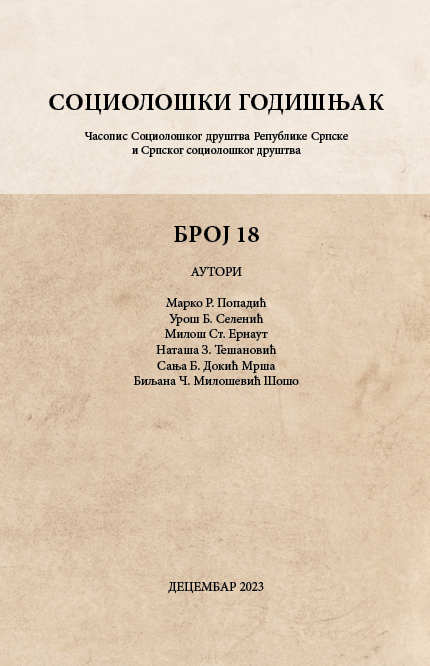Value of Information in the Post-Truth Era
Abstract
By reviewing the findings obtained thus far, this paper analyzes the impact of information and communication technologies (ICT) on the formation and availability of valuable informations. It is hypothesized that ICT has made the process of reaching valuable information easier and more difficult at the same time. By using scientific method of analysis, the overall goal of the study has been achieved, that is, a critical view of the role of ICT in having simultaneously accelerated and facilitated the formation, dissemination, and storage/availability of valuable information – but also led to unprecedented information disorder. By undermining people’s need to base decisions, attitudes, and opinions on valuable informations, the post-truth society erode one of the essential functions of the media, that is information.
References
Almeida Sousa, R. (2019). Freudian Narcissism In Cross-Media Storytelling: The Curious Case of Nujeen Mustafa. Politeia, vol. 9 (18), 11-26. Available at https://doi.org/10.5937/politeia0-24203
Bojić, Lj. i dr. (2021). Technofeudalism Illustrated by Trumps Twitter Suspension and Australia vs. Google and Facebook Dispute. Sociološki pregled, vol. LV (2), 538-561. Available at https://doi.org/10.5937/socpreg55-32105 [In Serbian]
Bratina, B. (2021). Post-truth – New Old Lie. Sociološki pregled, vol. LV (4), 1505-1525. Available at https://doi.org/10.5937/socpreg55-34726 [In Serbian]
Briggs, A., Cobley, P. (2005). The Media: An Introduction. Beograd: Clio. [In Serbian]
Čavalić, A. (2016). The Impact of The Quality of Data and Information on The Quality of Decisions. Ekonomska misao i praksa, vol. 25 (2), 495-513. Available at https://hrcak.srce.hr/file/252983 [In Croatian]
Čengić, L., Dokić-Mrša, S. i dr. (2021). Guidelines For The Use of Media, Information-Communication Technologies and The Children's Screen-Time. Sarajevo: Regulatorna agencija za komunikacije i Fondacija „Mediacentar“ Sarajevo. Available at https://docs.rak.ba//articles/162b2909-8217-4aee-844c-a4696ddfd174.pdf [In Serbian]
European Commission. (2018). Communication-Tackling Online Disinformation: a European Approach. Available at https://ec.europa.eu/digital-single-market/en/news/communication-tackling-online-disinformation-european-approach [In Croatian]
Fuchs, C. (2008). Internet and Society. New York: Routledge.
Huxley, A. (2009). Brave New World. Beograd: Libretto. [In Serbian]
High Level Group on Fake News and Online Disinformation. (2018). A Multi-Dimensional Approach to Disinformation. Luxembourg: Publications Office of the European Union. Available at https://digital-strategy.ec.europa.eu/en/library/final-report-high-level-expert-group-fake-news-and-online-disinformation
Kalinić, J. (2018). Ok, And What Is Pseudoscience? [Blog]. Available at https://quantumofjk.blogspot.com/2018/04/ok-sta-je-to-pseudonauka.html [In Serbian]
Kunczik, M., Zipfel, A. (2006). Einfuehrung in die Publizistik und Kommunikationswissenschaft. Zagreb: Zaklada Friedrich Ebert. [In Croatian]
Medijska i informaciona pismenost. (2021). Post-truth, Information Disorder and Infodemic. Available at https://medijskapismenost.ba/post-istina-informacioni-poremecaj-i-infodemija [In Serbian]
McLuhan, M. (2012). Electronic Media and The End of a Culture of Literacy. Loznica: KARPOS. [In Serbian]
Oxford Word Of The Year 2016. (2016). Available at https://languages.oup.com/word-of-the-year/2016/
Pariser, Е. (2011). Beware Online „Filter Bubbles“. Available at https://www.ted.com/talks/eli_pariser_beware_online_filter_bubbles/transcript?language=hr [In Croatian]
Postman, N. (1985). Amusing Ourselves To Death. New York: Viking Penguin Inc.
Potter, J. (2011). Media Literacy. Beograd: Clio. [In Serbian]
Subotić, O. (2011). Information-Controlled Society. Stari Banovci-Beograd: Bernar. [In Serbian]
Todorović, A. L. (2017). Discourse of New Technologies. Beograd: Clio. [In Serbian]
Trifković, S. (2017). Continuity of The Cold War. Beograd: Geopolitika. [In Serbian]
Tsekeris, C. & Zeri, P. (2020). The Coronavirus Crisis as a World-Historic Event in The Digital Era. Sociološki pregled, vol. LIV (3), 498-517. Available at https://doi.org/10.5937/socpreg54-27687
Turčilo, L. & Buljubašić, B. (2018). Alternative Facts and Post-truth in Bosnia-Herzegovina: Who (Really) Sets the Agenda? Sarajevo: IMEP. Available at https://www.academia.edu/38159189/ALTERNATIVE_FACTS_AND_POST_TRUTH_IN_BOSNIA_HERZEGOVINA_WHO_REALLY_CREATES_THE_AGENDA_OF_MEDIA?email_work_card=title
Turčilo, L. & Obrenović, M. (2020). Misinformation, Disinformation, Malinformation: Causes, Trends and Their Influence on Democracy. Sarajevo: Heinrich Boll Stiftung. Available at https://www.boell.de/en/2020/08/25/misinformation-disinformation-malinformation
Wardle, C., Derakhshan, H. (2017). Information Disorder: Toward an Interdisciplinary Framework for Research and Policy Making. Strasbourg: Council of Europe. Available at https://rm.coe.int/information-disorder-toward-an-interdisciplinary-framework-for-researc/168076277c

